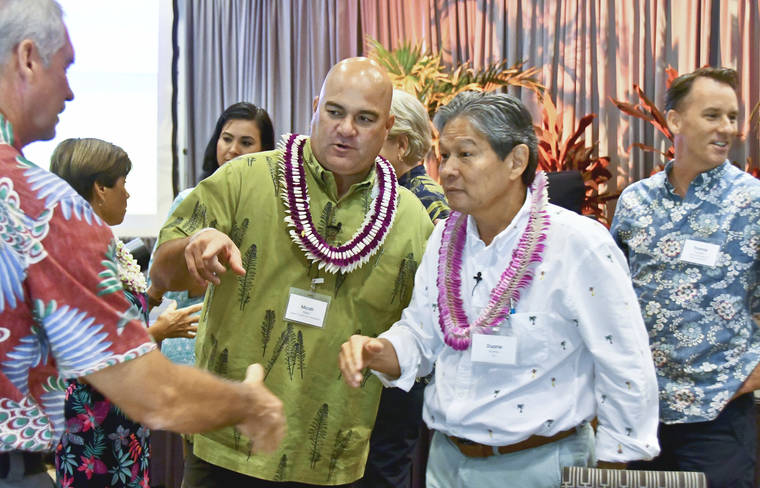POIPU — After hearing a short presentation Thursday on Kahauiki Village, a project that opened last year on Oahu to provide housing for the homeless, Monica Belz got right to the point with one question:
“Would it be possible to do something like this on Kauai?”
To answer the query from the CEO of Kauai Government Employees Federal Credit Union, Mayor Derek S.K. Kawakami rose from his seat and walked to the front of the room.
He said shortly after taking office in December, his administration reached out to Duane Kurisu, chairman of the Hawaii Executive Conference and a driving force behind Kahauiki Village.
He told Kurisu they were trying to address a homeless issue on Kauai and had identified a parcel of property suitable for a housing development.
That site — close to jobs, services and transportation — was Pua Loke Park.
“It’s where I grew up having lunch with my parents,” the mayor said.
The park has existing infrastructure, and “it has all the components that are necessary to effectively address homeless issues,” Kawakami said.
He said the land has been transferred from the state to the county (see the related story).
“So we have the property,” he said. “We are identifying community champions that are willing to do what it takes.”
About 150 people attended the Kauai Chamber of Commerce’s lunch at the Sheraton Kauai Resort to hear from Kurisu and Micah Kane, CEO and president of the Hawai‘i Community Foundation.
“We think that Kauai is in a very special place right now because of the leadership you have here,” Kane said.
HCF connects sources and funds with opportunities where they are needed most to impact people’s lives.
In 2018, HCT managed over $675 million in assets and distributed more than $62 million in grants to the community from funds at HCF, contracts and private-foundation grants.
That included $6.1 million in scholarships, $21 million in initiatives and partnerships and $21.9 million in donor-advised grants.
“A lot of that comes to Kauai,” Kane said.
There are 69 funds established to benefit Kauai and Niihau, including the Kauai Relief and Recovery Fund, the Annie Sinclair Knudsen Memorial Fund and Kauai Aloha Endowment Fund.
It has provided over $6.4 million in grants to nonprofits on Kauai and Niihau in the past three years, and over $285,000 in scholarships for more than 75 students in 2018.
“There is no doubt that as strong as our economy is right now in Hawaii, there are families who are not doing well,” Kane said.
Aligning resources, sharing data and working toward a common goal, Kane said, “that is the secret serum toward our success.”
Kurisu gave a brief outline of Kahauiki Village, which opened in January 2018 when 30 families moved into the first phase of prefabricated homes. Today, there are 41 families there and more than 100 adults and children.
This public/private partnership involved more than 1,000 volunteers. It was about passionate people bringing a vision to reality, Kurisu said.
The state, which owned the land, transferred it to the City &County of Honolulu, which in turn leased the property to aio Foundation for 10 years (with an option to renew for an additional 10 years) at $1 a year.
When built out, Kahauiki Village will have 144 one- and two-bedroom homes on 11.3 acres of land located between Nimitz Highway, Keehi Lagoon Park and Sand Island. It will provide long-term, affordable housing for about 150 homeless families with children.
It’s also about giving people another chance.
Kurisu said when he grew up, “people weren’t measured by how much money you made. Instead, they were measured by character, trust and responsibility.”
In order to survive, people shared, so if you caught two fish, you knew you weren’t keeping both, he said.
Today, though, money is the influencing factor.
Kahauiki Village is such a place where people will learn to be responsible and to help each other, Kurisu said.
Residents pay rent in the $700-to-$900 range per month and are free to live as they wish with two absolutes: no drugs, no alcohol.
He said of the original 31 families, only four are no longer there because of drugs.
“It was not our managers that reported it, it was their neighbors,” Kurisu said.
Kurisu said he sees Kahauiki Village as a solution for homelessness not only in Hawaii, but nationally and internationally.
Right before Kahauiki Village opened, Kurisu said there were families and children waiting in the parking lot. He said he cried as he held one keiki in his arms.
“This boy, he has a chance, he has hope, he has a chance to grew,” Kurisu said.
•••
Bill Buley, editor-in-chief, can be reached at 245-0457 or bbuley@thegardenisland.com.



Any reasonably civically minded, educated citizen should know that mixed demographic, mixed income communities are the ones that really thrive. Lumping same demographic and incomes into one area historically breeds more violence, poverty and non social mobility. Read a book sometime Bill the bully. We know this is an orange diaper baby supporting nimby rich old man rag. Just be real about your right wing agenda and don’t act like you really care. Peace….